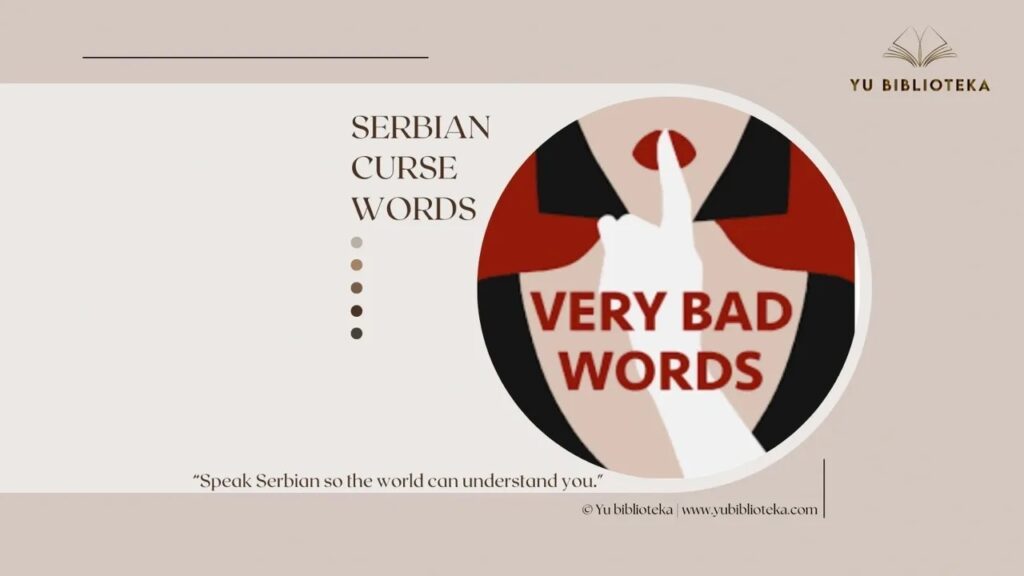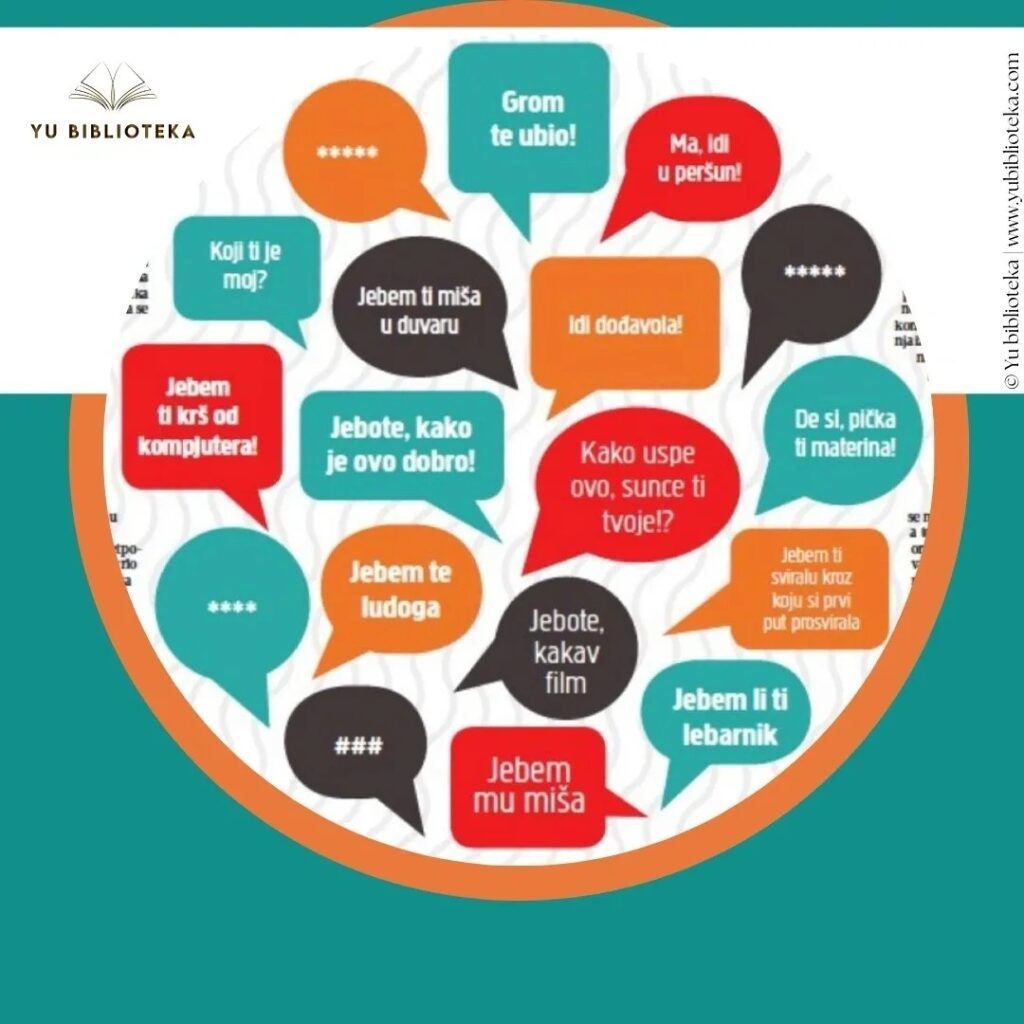The Sun, Mother, and Holy Parsley

The sun, the mother, and the holy parsley: An introduction to Serbian cursing
If you ever met a person from the Balkans, one of the first things you notice is their love towards producing nasty, often humorous, sometimes offensive curse words. Serbian people can tell you that it is an integral part of their national identity – alongside God, rakija and Novak Djokovic – to use bad words.
People curse. Geography, nationality, and creed have nothing to do with it.
People curse because, according to the most recent studies, it alleviates the physical pain, helps us build emotional resilience to unpleasant situations – things we usually have no control of – and more often than not, because it feels good.
It feels good to say jebem ti mater to someone who ticked us off, instead of slapping or hitting. (That’s a big no-no.)
Cursing checks some of the boxes of things parents teach us is wrong. Like stealing, or lying. But hey, if modern psychologists say it’s healthy to let out a bad word once in a while, who are we to disapprove.
“Speak Serbian so the world can understand you.”
Serbian language has some of the most creative explicit content known to mankind. It leaves the rest of the world baffled with why anyone would curse at things like the sun, mothers, bread, vegetables, and harmless animals.

The golden rule in Serbian cursing is that there are no rules.
You can combine the most ordinary words, add a bad one – the kind that gets censored on TV – or any other verb that has an ambiguous connotation, and voila! You’ve got yourself an original expression to use in the moments of anger, sadness, or even joy.
Just make sure it makes absolutely no sense.
I sh*it under your tiny grain!
When we talk about Serbian curse words, first we have to categorize them.
There are those that are considered archaic and on the milder side. This is what we think our ancestors sounded like during the Battle of Kosovo, or other more-less successful uprisings against the Ottoman empire.
Our brave ancestors cursed at the breadcrumbs – jebem li ti krušnu mrvu. F*ck your breadcrumbs does not sound particularly aggressive, although it checks all the boxes for absurdity.
Then, there’s the cutesy one – jedi rotkve. We have no idea why radishes were considered something nasty to eat at the turn of the 20th century. In the years to come radishes were replaced with things less edible and utterly gross.
It does sound a bit more gracious to say eat radishes, instead of sh*t, doesn’t it?
A fan-favorite, used mostly with the elderly, is sunce ti kalajisano. Due to its antiquity, you could often hear this coming from the foul mouths of grandads, war veterans, retired plumbers, woodworkers, and professional drivers.
It will remain the trickiest cultural and astrological mystery as to why Serbian people love swearing at the sun. Sun-f*cking expressions are among favorite ones in our language.
Sunce ti kalajisano would roughly be translated as – f*ck your tinned sun.
That’s right. It’s not only the sun, but the fact that it possesses the quality of being tinned, as those pewter dishes and cutlery archaeologists unearth from centuries old digging grounds.
We’d have to dig deep – just like those dusty archaeologists – to find out in what way the sun has wronged these people.
F*ck your bloody bread
‘Leb ti jebem is an oldie-goldie whose variations are still used today. For some reason, Serbian people find great joy in f*cking bread, but one could argue that it’s more of a way of greeting a friend than actual ill-wishing.
“Gde si ti, ‘leb ti jebem, nema te sto godina!”
This is a rather favorable way of saying hello to a dear friend you haven’t seen in (literally) a century. Sure, it’s not an ideal greeting for your old kindergarten teacher, or ex-boyfriend’s aunt, so use it with caution.

Go to parsley, go to cabbage, go to hell… just go.
Parsley. Who doesn’t like it (just don’t put it in sarma), but Serbs tend to swear and send you off to it when they are feeling particularly displeased.
Go to parsley is a nicer, PG-13 version of the classic go to hell. Go to parsley, go to cabbage, eat radishes… Serbs have a serious issue with vegetables.
Unless you’re an educated elderly chap who finds it beneath him to use such profanities, instead of vegetable-swearing you’d probably use the not-so-PG-13-word-for-male’s-genitals.
It’s weird to think that once there lived a Serbian language speaker who one day decided to tone down idi u kurac with frigging parsley.
“There ought to be a room in every house to swear in. It’s dangerous to have to repress an emotion like that.” Mark Twain
The next category of delicious Serbian swear words could be labeled as daily use.
These are the Serbian counterparts of short, but effective swears. Things you say when you realize you overslept, or when they cut you in traffic. You know, the snappy, expletive words that have woven themselves into our daily habits and vernaculars without even realizing.
Jebote, kol’ko je vruće. F*ck me, it’s hot.
Sranje, opet će kiša. Sh*t, it’s gonna rain again.
Ova jebena mašina se opet pokvarila! This f*cking washing machine broke down again!
Lost in translation
Cursing in our native tongue does something to our brain that no amount of translation will ever accomplish.
It’s like translating jokes and having to explain why they are funny. It loses its charm and originality as soon as you try to accommodate it to another language speaker’s mentality.
Imagine being extremely upset with someone. Try to imagine all the bad stuff that you would say, all the names you’d call them. Now imagine saying this to the person who’s driven you up the wall – I will f*ck your sun out of the sky.
It just doesn’t hit the right note in English, doesn’t it?
Sjebaću ti sunce sa neba!
Ah, there you go. Pure explicit adrenaline shot.
Sonic the Frigging Hedgehog
So far, we’ve established that Serbs care little about vegetables and the bright star that gives us life and warmth. In that sense, the animal kingdom must have equally wronged us. Dogs have a bad rep for being the number one animal we curse at, or compare people to.
Also, hedgehogs!
Jebao si ježa u leđa literally translates to you f*cked the hedgehog in the back, which means you’re in trouble.
Okay, this one actually makes sense. You don’t want to touch the back of a hedgehog with a finger, let alone any other skin-sensitive body part, otherwise you’d be in serious trouble.
When we are trying to offend someone aiming at their poor cognitive skills, we would typically say – konju jedan. I don’t know about you, but horses don’t strike me as particularly dumb animals.

Future Perfect Past Conditional
Serbian cursing transcends the barriers of nationalities and racism – we can curse at any nations and skin colors, we’re not fussy about it – as well as time. Our curse words are not limited by the regular verb tenses or any conditional for that matter, but rather explore what happened when something else has not happened yet .
Jeb’o sam ti mater kad te uhvatim.
In Serbian, this would roughly be translated as – I f*cked your mother when I catch you.
As you see, the doer of the action has not yet caught the wrong-doer who’s soon going to copulate with the back of a hedgehog, but the action of mother-f*cking has already taken place.
Don’t worry if you can’t seem to understand how this works. The hidden beauty of Serbian cussing lies in the illogical and the impossible.
Curse words are an outlet to our frustrations and limitations. You can’t always beat the crap out of the guy who cuts you in traffic, but you sure can ugly curse him and his sun straight out of the sky, and his parsley, while making him eat radishes.
